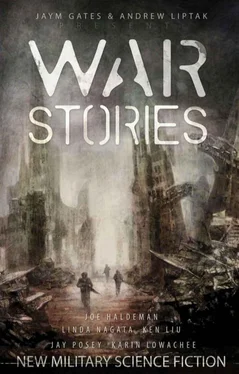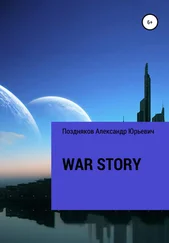IGUO HAD ANOTHER REPORT ON his news feed about a ghost girl living in the dump outside Bujumbura, so he put two Cokes in a hydrobag and hailed a taxi outside the offices. It was cool season now and the sky was rusty red. The weather probes were saying dust storm, dust storm, remember to shut the windows. Iguo put his head back against the concrete wall and wondered how a ghost girl living by herself was not yet dismembered and smuggled out to Tanzania. Maybe some entrepreneur was cutting her hair to sell to fishermen. Maybe she was very lucky.
The graffitied hump of the taxi bullied its way through bicycles and bleating sheep. Iguo slung the hydrobag over his shoulder and pulled out his policense. This was not an emergency, not strictly, but Iguo did not pay for transit if it could be free. The taxi rumbled to a stop and when the door opened, it bisected a caricature of President Dantani shitting on a rebel flag. He climbed inside and switched off the icy blast air conditioning.
“Bujumbura junkyard,” Iguo said, pressing his policense against the touchscreen.
“Calculating,” said the taxi.
§
The junkyard was a plastic mountain. Whatever wire fence had once marked its boundaries was long since buried. Bony goats wandered up and down the face, chewing on circuits. Scavengers with rakes and battered scanners stumped around the bottom, searching for useable parts or gold conductors. Iguo had the taxi stop well away, before it gutted a tire on some hidden piece of razor wire or trash. It didn’t want to wait, but he used the policense again and it reluctantly hunkered down.
There was a scavenger with no nose and no tag sitting in the sand. Stubble was white on his dark skull. A cigarette dangled from his lips. Iguo squatted across from him.
“ Mwiriwe , Grandfather.”
“ Mwiriwe , Policeman. My shit, all legal.” He waved off a fly. “You ask anyone.”
“I’m looking for the ghost girl,” Iguo said. “She lives here, yeah?”
The scavenger massaged his knobby calves. “Oh, yes.”
“How long here?”
“Aye, two weeks, three weeks since she show up. Her and her imfizi .” He spat into the sand. “She’s a little witch, like they say. She’s got the thing following her all around.”
Iguo squinted up the crest of the junk pile. “How does she survive?” he asked. He saw the scampering silhouettes of children and wondered if one was her.
The scavenger shrugged. “She finds good stuff. Me, I buy some. And nobody trouble her, or that damn imfizi take them to pieces.” He tapped the orange ember of his cigarette, eyed the hydrobag on Iguo’s shoulder. “You here to decommission it? You look soldier.”
“I’m here for the girl,” Iguo said.
“Witch,” the scavenger corrected. “You say it’s genes, but it’s witch. I know. I see her.”
“Goodnight, Grandfather.” Iguo straightened up. He had speakaloud pamphlets in the taxi, ones that explained albino genetics in cheerful Kirundi and then French, ones he did not distribute as often as he was supposed to, but Iguo knew that by the time a man is old his mind is as hard as a stone.
§
He found the ghost girl rooting through electric cabling, feet agile on the shifting junk. Her sundress was shabby yellow and stained with gasoline. Her hands and feet were callused. Still, she was tagged: her tribal showed up Hutu and she was inoculated against na–virus. Not born in the street, then.
“Anything good?” Iguo asked.
She turned around and blinked rheumy pink eyes at him. “Who are you?”
“My name is Iguo. I work for the government.” He unslung the hydrobag and took out the first bottle. “You want a fanta?”
“Yes.” The girl rubbed her pale cheek. “Yes, I wanna.”
“Here.” Iguo opened the chilly Coke between his molars. Clack. Hiss. He held it out. “What’s your name?”
“Belise.” The ghost girl wound the cable carefully around herself, eyes on the sweating bottle. “Set it down, back up some,” she suggested. “I’ll get it.”
“You don’t need to be afraid of me,” Iguo said, wedging the drink in a nook of bent rebar. “I’m here to take you somewhere safe. Here, here isn’t safe for you.” He scooted back. “Belise, do you know what an albino hunter is?”
“It’s safe,” Belise said, patting a piece of rusty armor. “My baba is here.” She clambered down to get the Coke and all at once something very large burrowed out from the junk pile. Motors whirred as it unfolded to its feet, shedding scrap metal. The robot was sized like a gorilla and skinned like a tank. The sensory suite glittered red at him. Iguo hadn’t seen an imfizi drone in many years and the sight jolted him.
“Shit,” Iguo said, as Belise skipped back up the pile, bottle cradled in her grimy hands. He realized the old man had been talking sense.
“My baba ,” the ghost girl said proudly. “My daddy is very strong.” She swigged from the Coke and grinned at him.
§
Iguo had retreated to the bottom to re–evaluate things. Clouds were still building crenellations in the sky, and now wind whistled in and out of the junk. He skyped the offices for a list of active combat drones, but of course it was classified, and the official line was still that they had all been smelted. He sat and drank his own Coke and watched Belise step nimbly across a car chassis while the drone lumbered behind her, puffing smoke.
There had been many of them, once. Iguo knew. He remembered seeing them stalk across open ground sponging up rebel fire like terrible gods while the flesh troops circled and sweated, lying in this ditch and then another, so fragile. He remembered the potent mix of envy and disdain they all felt for the piloting jackmen, cocooned safe in neural webbing a mile away.
He remembered best when one of the imfizi was hacked, taken over by some rebel with a signal cobbled together from a smartphone and a neural jack. People said later that it had been Rufykiri himself, the Razor, the hacker who sloughed off government security like snakeskin, but nobody really knew. Iguo remembered mostly because that day was when half of his unit was suddenly gone in an eruption of blood and marrow. Iguo did not trust drones.
“You see, now.” The old scavenger was back. He ran a dirty nail around the hollow of his nose. “Nobody troubles her. That thing, deadly. She has it bewitched.”
“It’s malfunctioning,” Iguo said. “Not all of them came back for decommissioning. Crude AIs, they get confused. Running an escort protocol or something like that.” He narrowed his eyes. “Not witchcraft.”
“Lucky malfunction for her,” the old man said. “Lucky, lucky. Else she would be chopped up, yeah? For eurocash, not francs. Much money for a ghost.” He smiled. “A rocket could do in that imfizi . Or an EMP. You have one?”
“I will chop you up, Grandfather—” Iguo took a long pull at his drink, “—if you talk any more of muti . You live in a new time.”
“What, you don’t want to be rich?” The scavenger hacked up a laugh.
“Not for killing children,” Iguo said.
“Ah, but you were in the war.”
Iguo stood up.
“You were in the war,” the old man repeated. “You sowed the na–virus and burned the villages and used the big knife on the deserters. Didn’t you? Weren’t you in the war?”
Iguo wanted his fingers around the scavenger’s piped neck until the esophagus buckled, so he took his Coke and walked back up to try again with the ghost girl.
§
The drone had been repairing itself, he could see it now. Swatches of hardfoam and crudely–welded panels covered its chassis. Spare cables hung like dead plants from its shoulders. It was hunched very still, only swiveling one camera to track Iguo’s approach. Belise was sitting between its feet.
Читать дальше












